Markets
Why New York and London Coffee Markets Closed Lower This Past Week
New York and London coffee markets declined last week due to weak Vietnamese prices and increased Vietnamese harvest activity. Demand for Vietnamese coffee is low, challenging bullish traders. While rain is forecasted in Brazil’s crop areas, concerns remain about crop losses in both Brazil and Vietnam despite the onset of Brazil’s rainy season.
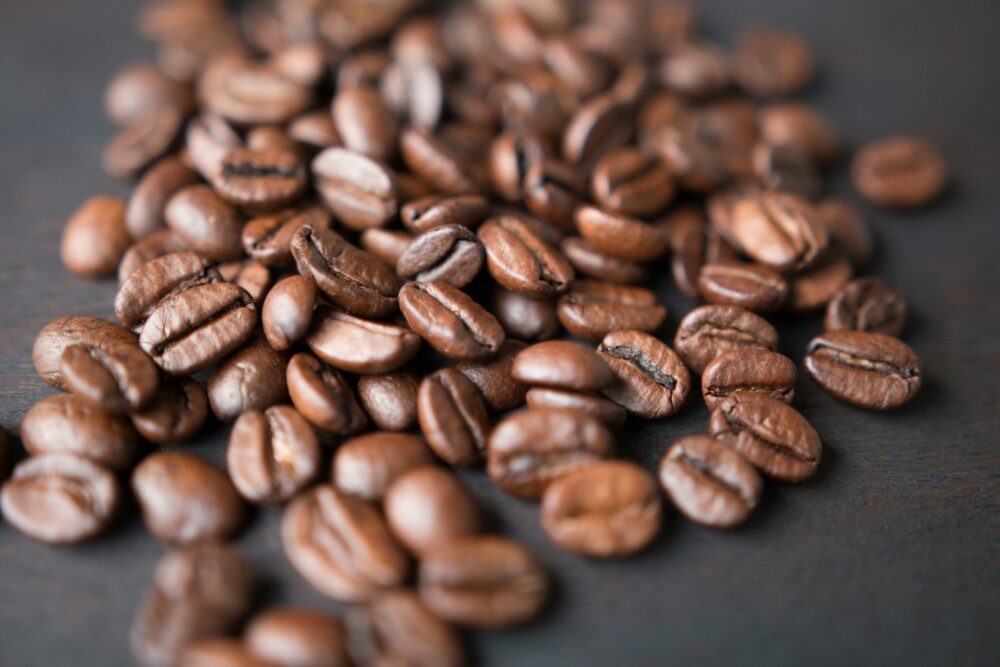
Wheat: The markets were lower last week despite a relatively strong weekly export sales report from USDA and ideas of reduced production in Russia. The dry weather outlook continues for Russia and the US. At least two Wheat producing regions in Russia have declared a state of emergency for Wheat producers due to a lack of rain and little to no rain has been a problem with Winter Wheat planting in the US.
Ideas are that the Great Plains are too hot and dry for best Wheat development are still around as the Winter crop gets planted. It is also hot and dry in western Canada. Both areas could get better rains in the next two weeks. Cash markets in Russia were higher as production estimates remain lower and two regions have been declared a farming emergency due to the hot and dry weather.
Weekly Chicago Soft Red Winter Wheat Futures
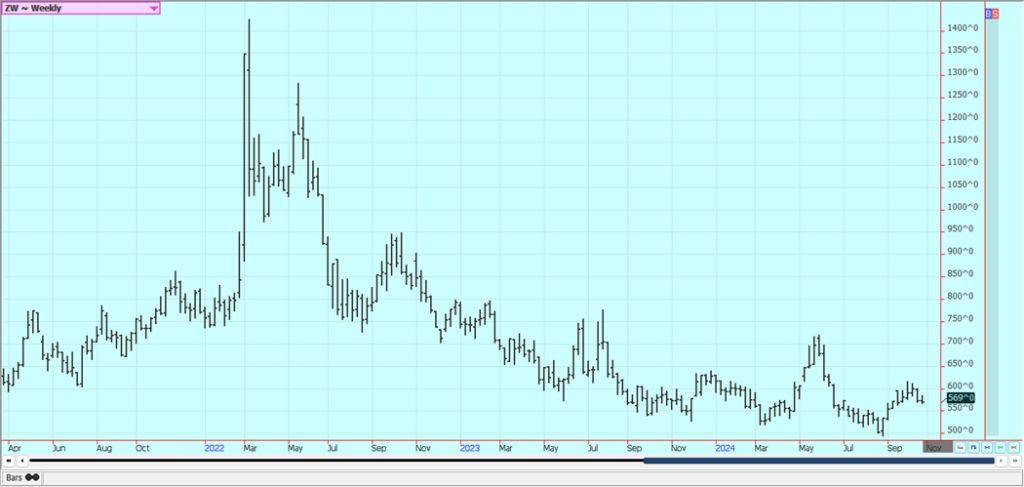
Weekly Chicago Hard Red Winter Wheat Futures
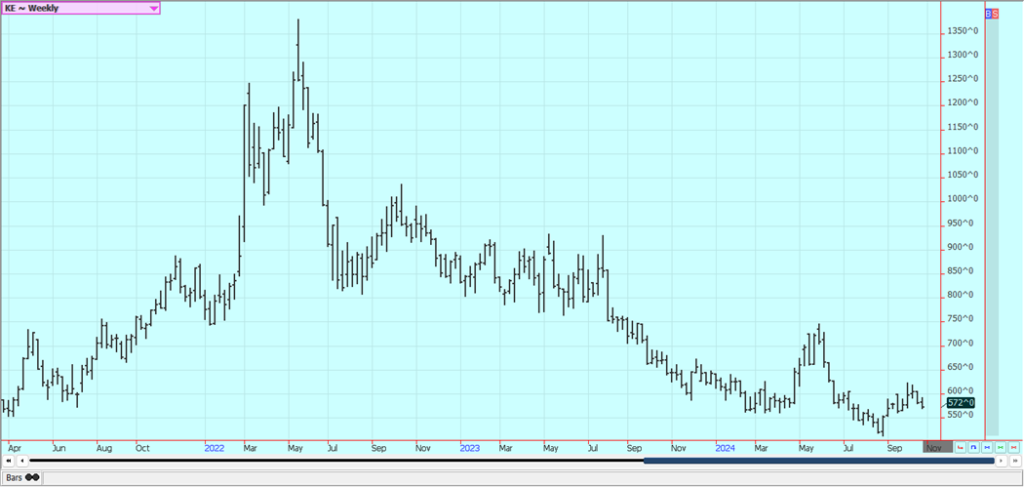
Weekly Minneapolis Hard Red Spring Wheat Futures
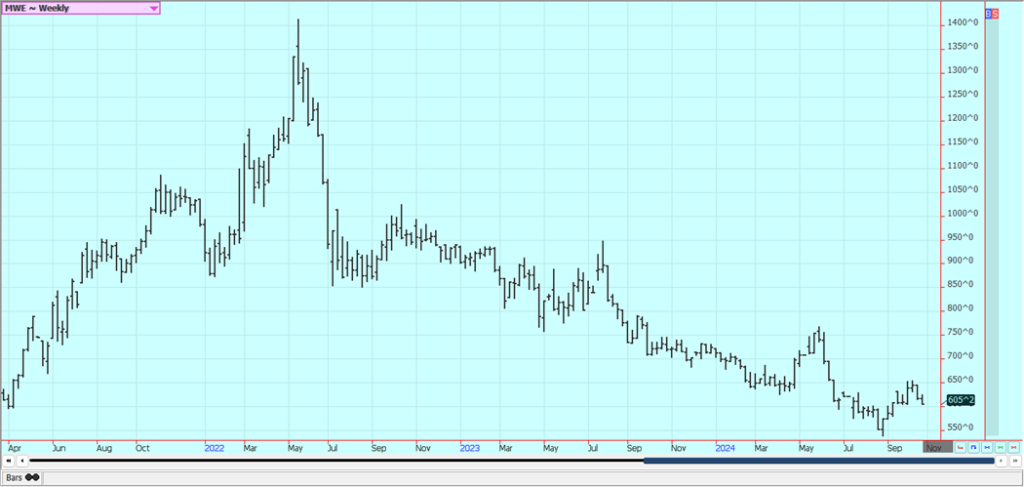
Corn: Corn closed higher in response to a very strong weekly export sales report and on strong demand ideas in general. Oats were a little lower. The harvest is still active and yield reports in general have been strong. It remains very dry in the Midwest to promote the very active harvest progress. The harvest will be complete in two weeks or less. Corn is being harvested with dry grain.
The Corn is often well below 12% moisture level and this could cost some yield at the end of the day. Crop conditions in southern Brazil and Argentina with reports of ample moisture in southern Brail and report of improving moisture levels in Argentina. The demand has been strong and it could be that the US political situation is playing a part in the strength in demand as many fear that Trump can win and would impose new tariffs and create trade wars.
Weekly Corn Futures
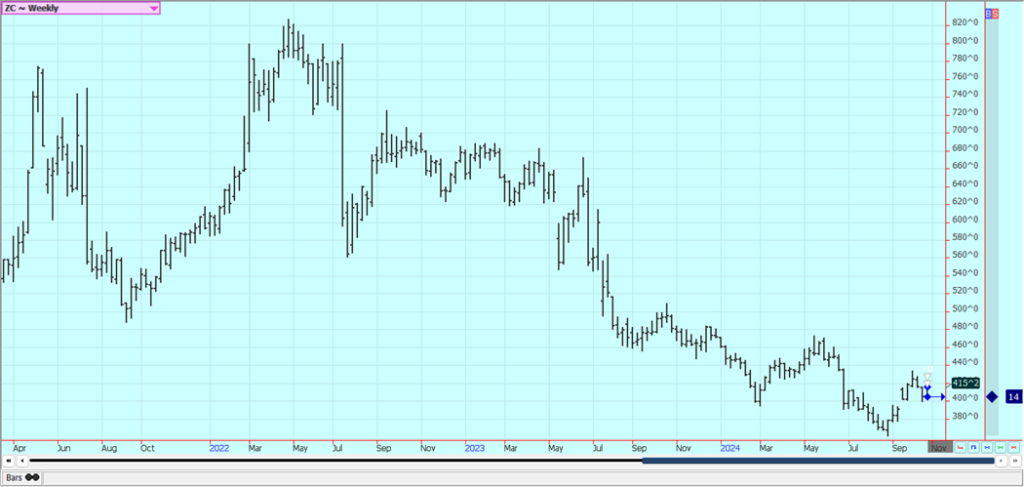
Weekly Oats Futures
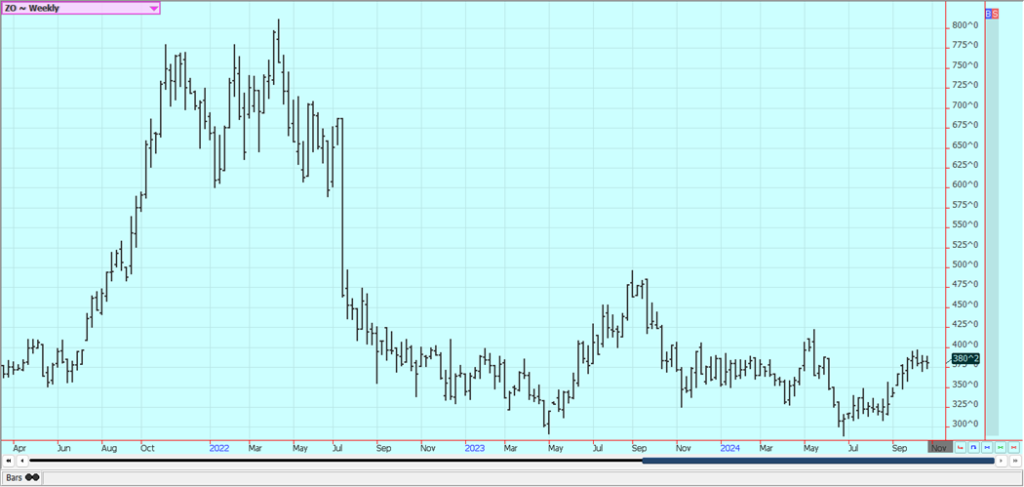
Soybeans and Soybean Meal: Soybeans and Soybean Oil were higher and Soybean Meal was lower last week on demand reports that were strong again for export in the weekly and daily export sales reports released on Thursday. Brazilian farmers are planting what is expected to be a very big crop in central and northern areas of the country. An uptrend is most likely starting. Ideas are that a potential Trump presidency would hurt trade potential with many countries, but especially China.
It could be that export buyers and sellers are getting ahead of any threat of a new Trump presidency and the threat of another big round of tariffs now. China has announced new economic support measures for its economy last week. Warm and dry weather in the Midwest recently has hurt production ideas due to ideas of small and very dry beans in the pods. Farmers have focused on Soybeans harvest but now are almost done and are switching to Corn.
Soybeans ae often harvested at moisture levels below 10% this year. Dry weather will last all week. Central and northern Brazil rains will stick around as it looks like the rainy season is now underway. Soils are in much better shape in southern Brazil and Argentina.
Weekly Chicago Soybeans Futures
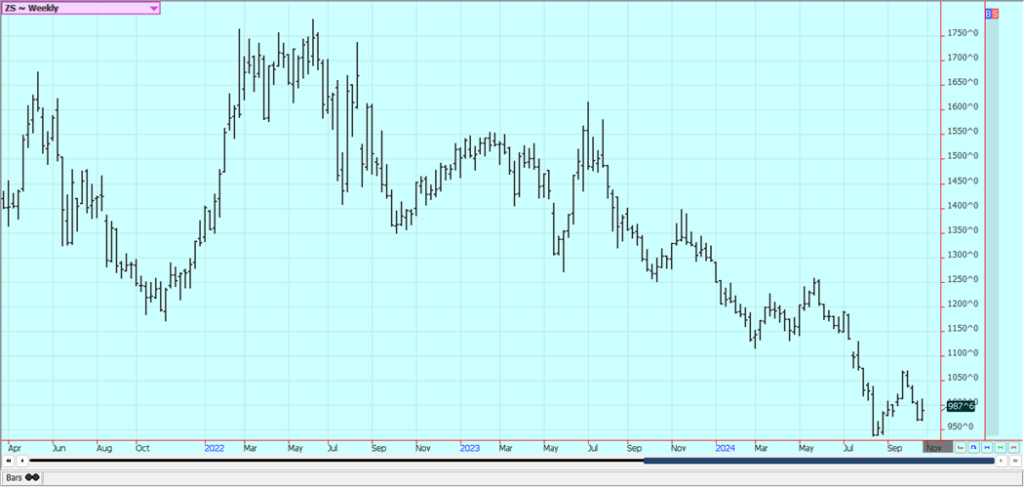
Weekly Chicago Soybean Meal Futures
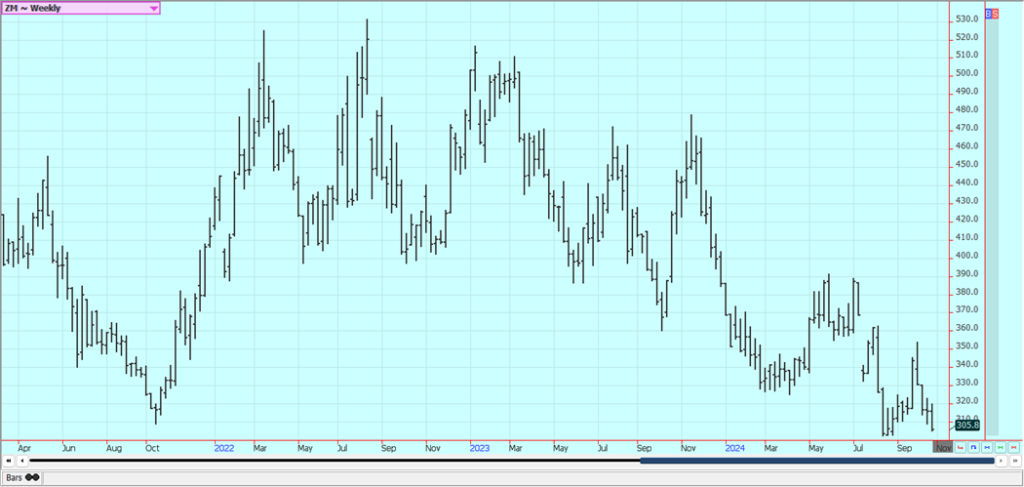
Rice: Rice closed a little higher last week in choppy trading and trends are still mixed on the daily charts. The US Dollar was higher and this hurt demand ideas. Lower Asian prices are still reported after India opened up exports for non Basmati White Rice in recent weeks. Brazil prices remain strong and well above US prices.
The US weather has been an issue much of the growing season with too much rain early in the year. Some areas are now too hot and dry, especially in Texas, and Texas yields are down. The harvest is over for most US producers.
Weekly Chicago Rice Futures
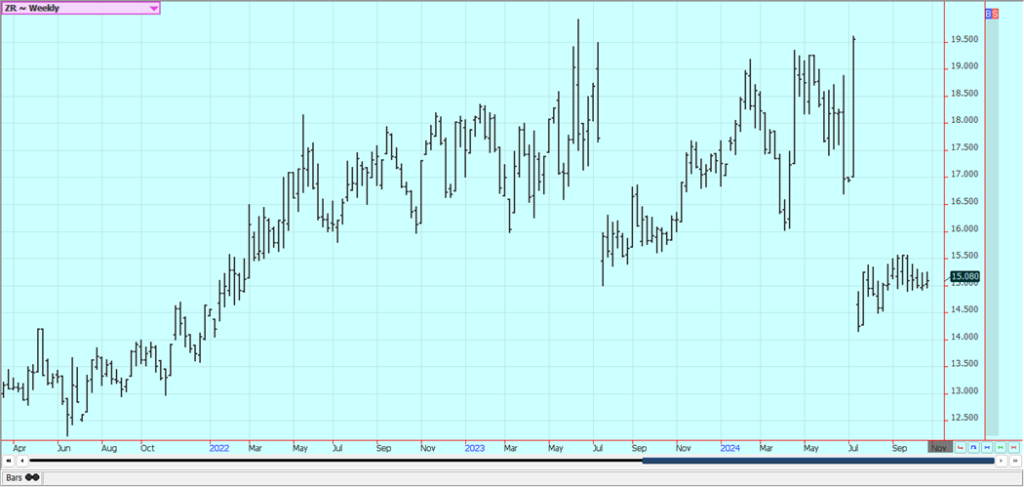
Palm Oil and Vegetable Oils: Palm Oil was higher last week on strength in outside markets and on reports from private sources of good demand. There are ideas of weaker production to go along with the reports of good demand. Canola was higher as competing oils also rallied.
Ideas are that China might be buying ahead to get imports in place before any new tariffs are decided and the Canadian Grain Commission reported strong Chinese demand earlier in the week. The weather has been hot and dry in Canada, and it looks like Canola production has been impacted. The weather has called for dry conditions in the Prairies and yields are expected to be the same or less.
Weekly Malaysian Palm Oil Futures:
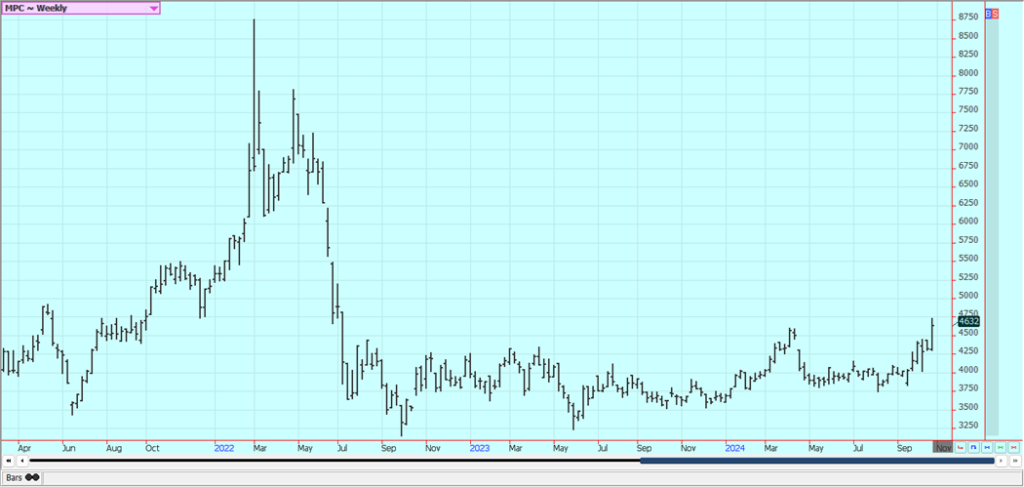
Weekly Chicago Soybean Oil Futures
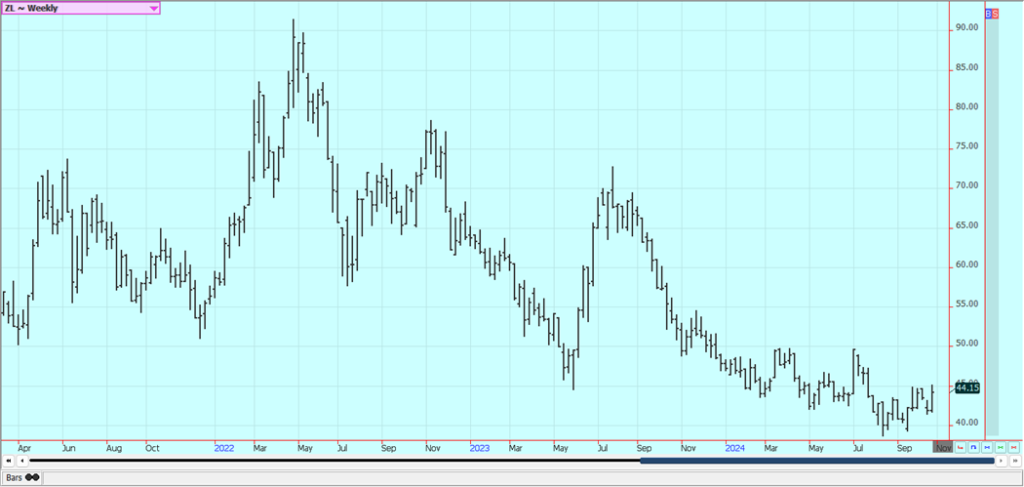
Weekly Canola Futures
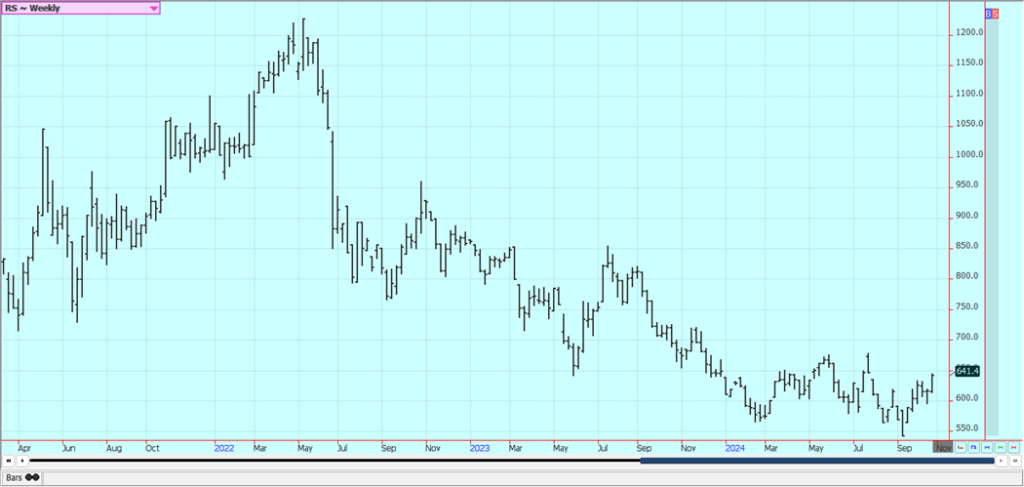
Cotton: Cotton was lower last week after a week of choppy trading as export demand remains weak and the US Dollar was strong. Trends are mixed in this market. China moved to lower interest rates again and there are hopes this move will help restart the economic engine there. Real estate has been the big problem there. There are still reports of weaker demand potential against an outlook for improved US production in the coming year.
Weekly US Cotton Futures
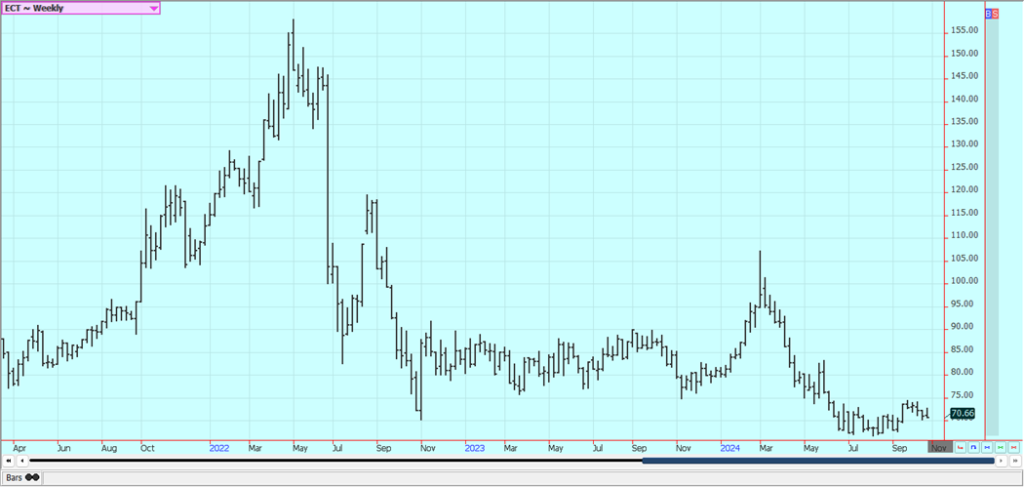
Frozen Concentrated Orange Juice and Citrus: FCOJ closed higher last week and was led higher by the spot November contract as the market remains short of juice. Trends are turning up again in this market. USDA cut Florida oranges production to 15 million boxes, from 18 million in its previous report and 20 million last year.
The market remains well supported in the longer term based on forecasts for tight supplies in Florida. The reduced production appears to be mostly at the expense of the greening disease. There are no weather concerns to speak of for Brazil right now. Rain is expected this week.
Weekly FCOJ Futures
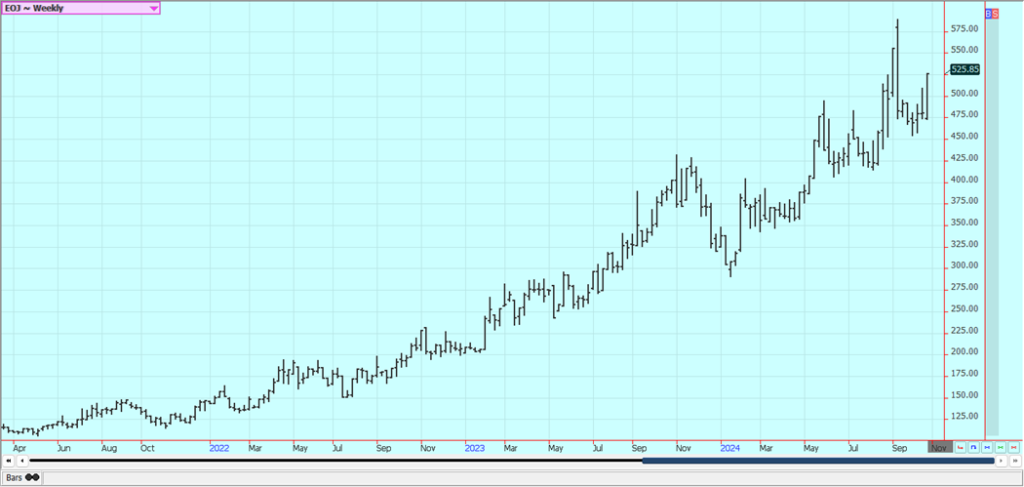
Coffee: New York and London were lower last week on reports of weakness in Vietnamese coffee prices, and the chart trends are down in both coffee markets as the coffee harvest in Vietnam is more active.
The demand for Vietnamese Coffee is reported to be less right now and this has been a big problem for bullish coffee traders. Rain remains in the forecast for Brazil coffee crop areas but as crop losses are still a good possibility in Brazil and Vietnam. There are now reports for good rains in Brazil as the rainy season is now under way after very dry conditions.
Weekly New York Arabica Coffee Futures
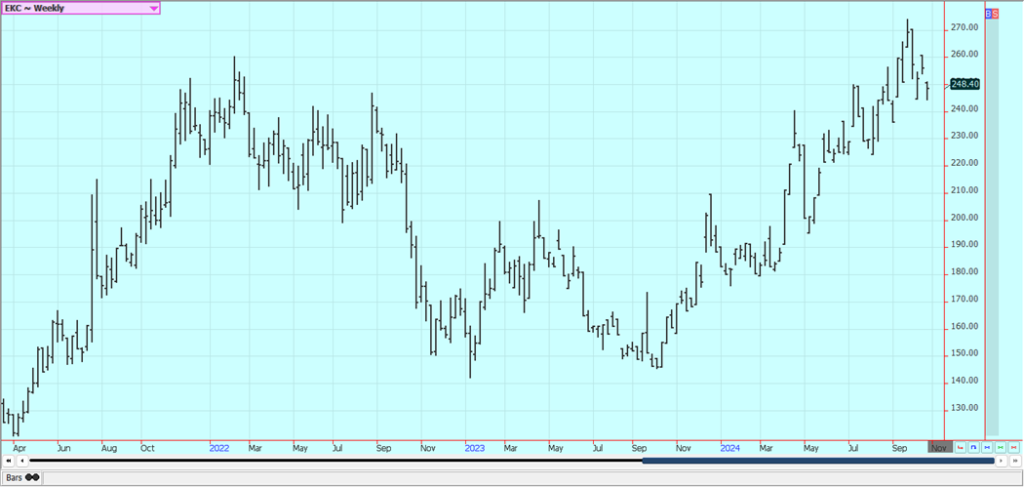
Weekly London Robusta Coffee Futures
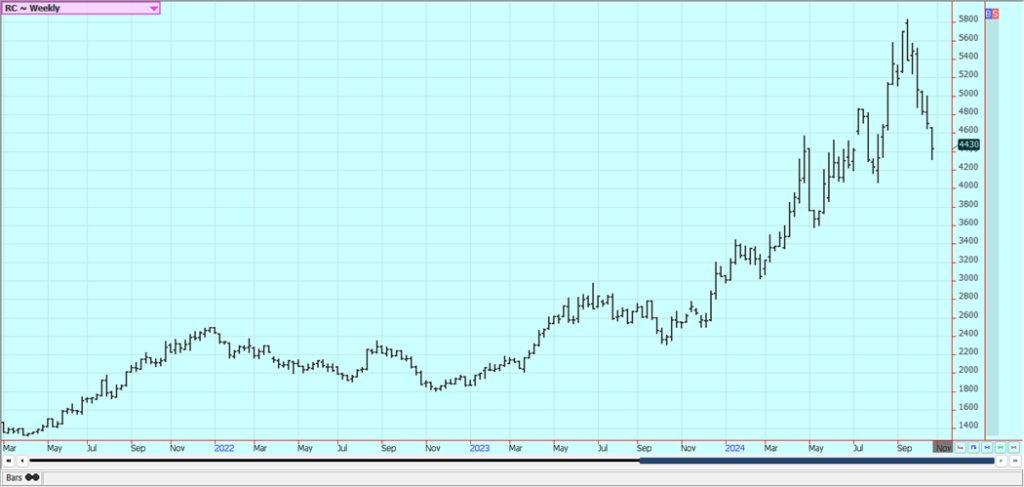
Sugar: New York and London closed slightly lower last week. Trends are sideways to down in New York but are sideways in London. Harvest progress is active in Brazil and growing conditions are much im-proved in India and Thailand. Indian and Thai monsoon rains have been very beneficial, and mills are expecting strong crops of cane. It is also wet in Brazil and this has affected harvest progress. Total Brazil production has been affected by drought seen earlier in the year and the fires that destroyed crops in some areas.
Weekly New York World Raw Sugar Futures
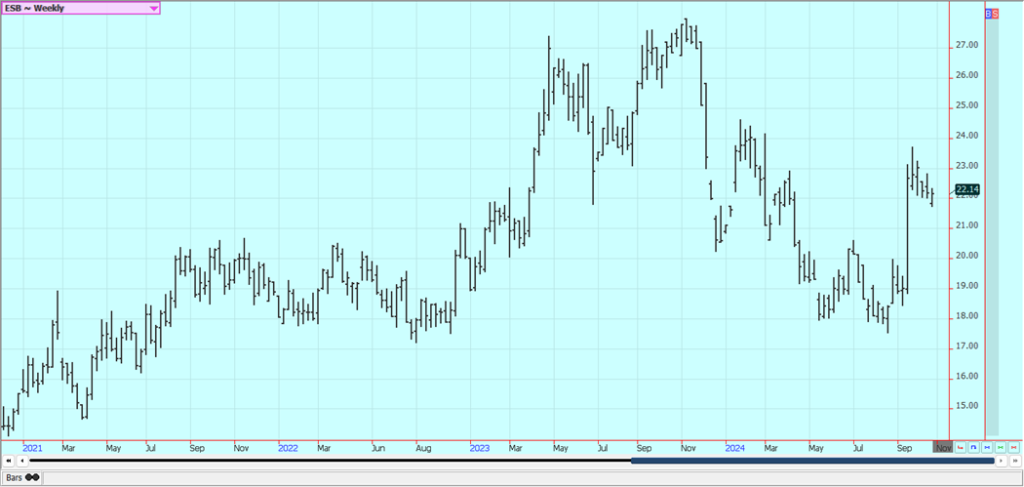
Weekly London White Sugar Futures
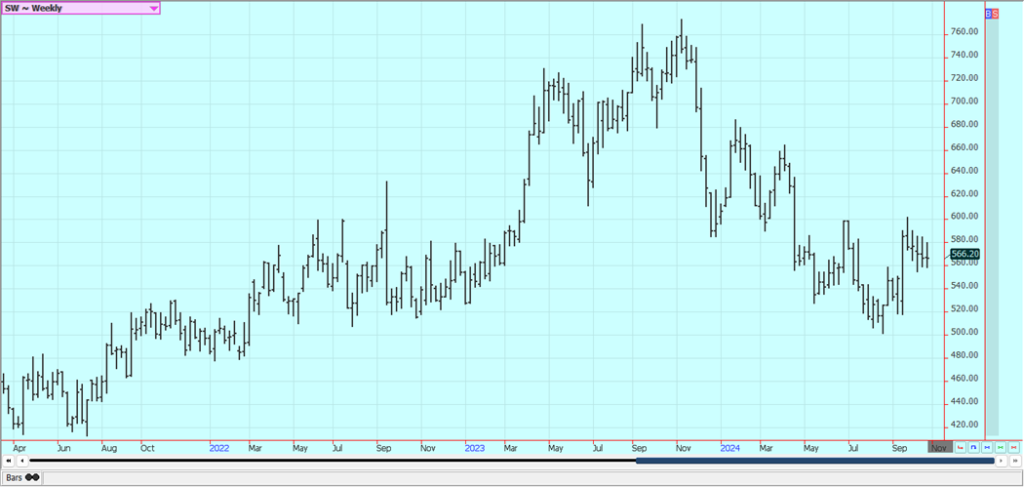
Cocoa: New York closed higher and London closed lower last week on better harvest conditions in West Africa. An Ivory Coast government official said that the country could produce 10% more Cocoa this year although he noted that it has been very wet recently and yields could be affected. It has been very wet in West Africa lately and this is bringing concerns that pod disease could develop. Production in West Africa could be stronger this year on the overall improved weather in Ivory Coast and Ghana.
Weekly New York Cocoa Futures
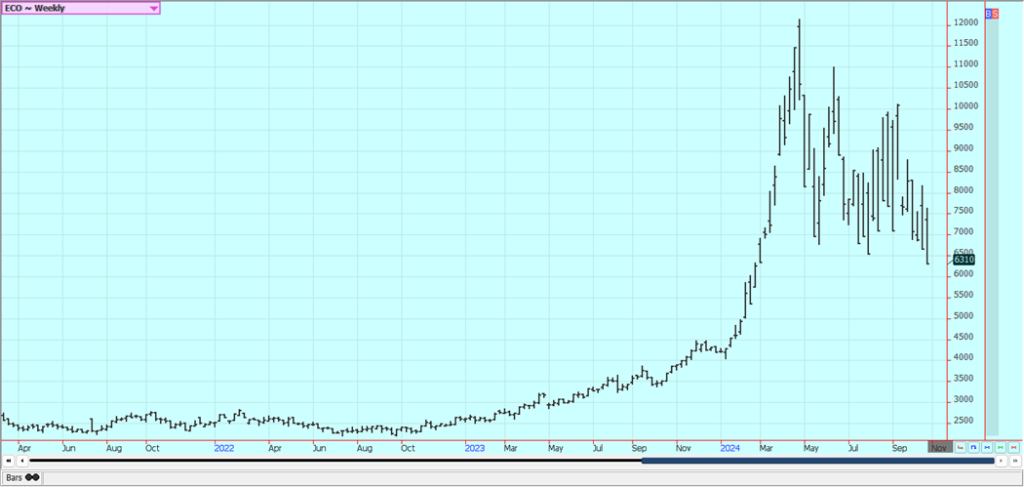
Weekly London Cocoa Futures
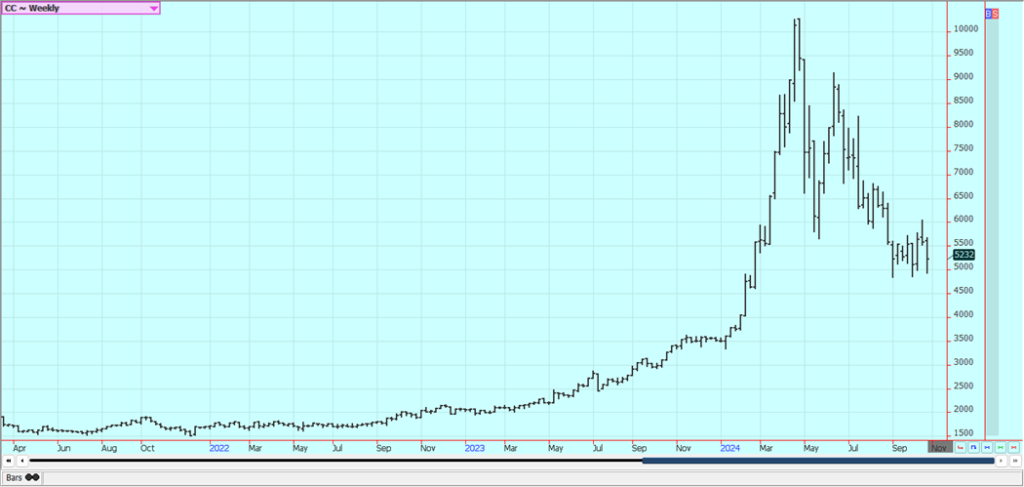
__
(Featured image by Mark Daynes via Unsplash)
DISCLAIMER: This article was written by a third party contributor and does not reflect the opinion of Born2Invest, its management, staff or its associates. Please review our disclaimer for more information.
This article may include forward-looking statements. These forward-looking statements generally are identified by the words “believe,” “project,” “estimate,” “become,” “plan,” “will,” and similar expressions, including with regards to potential earnings in the Empire Flippers affiliate program. These forward-looking statements involve known and unknown risks as well as uncertainties, including those discussed in the following cautionary statements and elsewhere in this article and on this site. Although the Company may believe that its expectations are based on reasonable assumptions, the actual results that the Company may achieve may differ materially from any forward-looking statements, which reflect the opinions of the management of the Company only as of the date hereof. Additionally, please make sure to read these important disclosures.
Futures and options trading involves substantial risk of loss and may not be suitable for everyone. The valuation of futures and options may fluctuate and as a result, clients may lose more than their original investment. In no event should the content of this website be construed as an express or implied promise, guarantee, or implication by or from The PRICE Futures Group, Inc. that you will profit or that losses can or will be limited whatsoever.
Past performance is not indicative of future results. Information provided on this report is intended solely for informative purpose and is obtained from sources believed to be reliable. No guarantee of any kind is implied or possible where projections of future conditions are attempted. The leverage created by trading on margin can work against you as well as for you, and losses can exceed your entire investment. Before opening an account and trading, you should seek advice from your advisors as appropriate to ensure that you understand the risks and can withstand the losses.

-

 Crowdfunding2 weeks ago
Crowdfunding2 weeks agoNewcleo Raises $85 Million to Advance Fourth-Generation Nuclear Reactors
-

 Markets2 days ago
Markets2 days agoMarkets, Jobs, and Precious Metals Show Volatility Amid Uncertainty
-

 Biotech1 week ago
Biotech1 week agoDNA Origami Breakthrough in HIV Vaccine Research
-

 Cannabis6 days ago
Cannabis6 days agoWhen a Cutting Becomes a Cannabis Plant: Court Clarifies Germany’s Three-Plant Rule

























